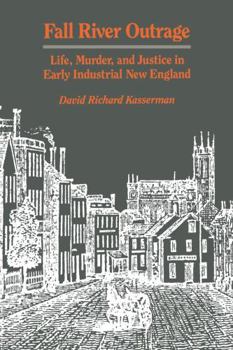Fall River Outrage: Life, Murder, and Justice in Early Industrial New England
Select Format
Select Condition 
Book Overview
Fall River Outrage recounts one of the most sensational and widely reported murder cases in early nineteenth-century America. When, in 1832, a pregnant mill worker was found hanged, the investigation... This description may be from another edition of this product.
Format:Paperback
Language:English
ISBN:0812212223
ISBN13:9780812212228
Release Date:April 1986
Publisher:University of Pennsylvania Press
Length:296 Pages
Weight:1.05 lbs.
Dimensions:0.7" x 6.1" x 9.1"
Customer Reviews
1 rating
The murder of Sarah Cornell, or Church vs. State
Published by Thriftbooks.com User , 15 years ago
Sixty years before Lizzie Borden and her legendary axe splashed blood over the name of Fall River, Massachusetts, the growing community was the site of a murder that put the industrial revolution and the Methodist faith on trial. In December 1832, unmarried and pregnant mill worker Sarah Maria Cornell was found hanging from a haystack support pole outside Fall River. A prominent Methodist minister named Ephraim Kingsbury Avery was accused of seducing and then murdering her. When Avery went to trial, two large and opposing institutions faced off. The Fall River industrialists portrayed Sarah Cornell as an innocent victim of a "wicked married man". Kasserman wrote, "In trying to clear her name, they protected their own." Their concerns were valid: in 1832 more women were leaving their parents' homes to take jobs in mills and factories, and if these workplaces became known as hotbeds of immorality, parental intervention could deprive them of badly needed workers. The Methodist Episcopal Church supported the opposite impression of the victim: the more lascivious she appeared to have been, the less likely it was that Avery alone had a reason to kill her. Methodism, with its emphasis on emotionality and easy salvation, was regarded with suspicion in a society dominated by the austere Calvinist Congregational Church. The Methodist leaders could ill afford to have a scandal topple the precarious position the church occupied in Jacksonian America. Apparently Avery's lawyers, in condemning Sarah Cornell as a harlot, were the first to use the character of the female victim as a defense strategy. Although I enjoyed this book, it might not be suitable reading for those who prefer a lighter, creative nonfiction approach to crime writing. Kasserman adheres faithfully to the record, and does not condense much for the sake of clarity or smooth flow. Personally, I'm glad that he was so thorough. Such solid research contributes greatly to our understanding of early American society.




